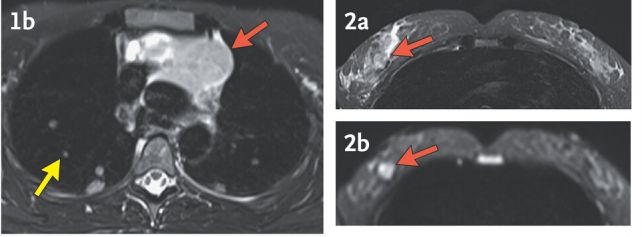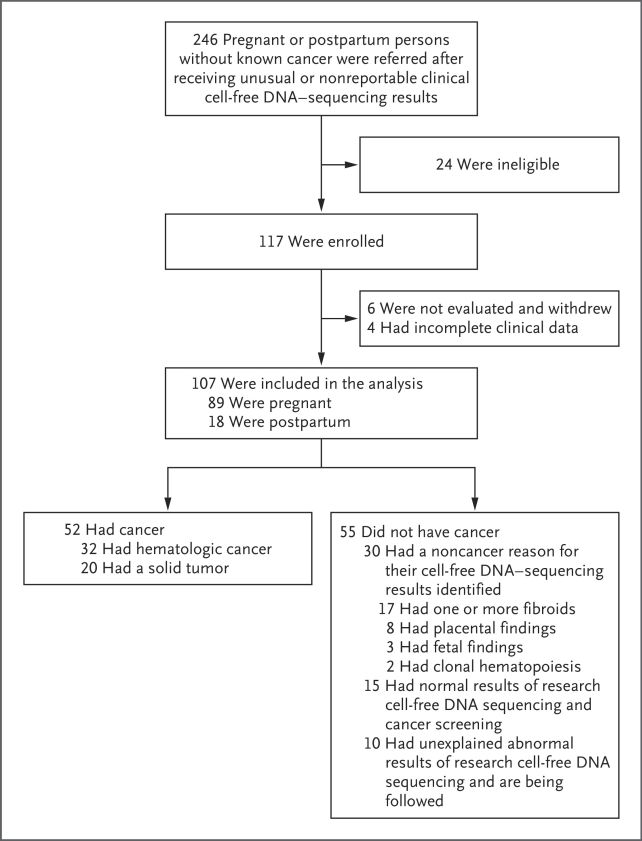A DNA screening to look for fetal abnormalities can render some unexpected results.
According to a new analysis, a cell-free DNA screening to test for chromosomal disorders can also reveal undetected cancer in the person carrying the child. In a study of patients whose tests yielded puzzling results, nearly half were harboring secret cancers.
To be absolutely clear: the study only analyzed pregnant people whose test results were difficult to interpret; so those who went on to receive a cancer diagnosis were a tiny minority of all pregnant people.
But of those patients diagnosed with cancer, a significant number had no symptoms, or only symptoms attributed to pregnancy, suggesting that more rigorous cancer screening, and paying closer attention to anything that might look peculiar, is warranted during obstetric care.
"Our results support the use of whole-body MRI in the evaluation of pregnant persons who receive prenatal cfDNA-sequencing results suggestive of cancer," writes a team of researchers led by geneticist Amy Turriff of the National Institutes of Health in the US.
"Further investigation of cfDNA-sequencing patterns would help to identify the subgroup of persons with nonreportable results who might have cancer."

A cell-free DNA test, or cfDNA, is a test of the placental material that is present in the bloodstream of a pregnant person. It can check for unusual chromosome numbers in a way that's safe for both parent and fetus. The test samples the degraded DNA fragments of a fetus, which are present without having to take a sample from within the uterus, as is the case with invasive amniocentesis tests.
An unborn fetus is piggybacking on a larger biological system, that of the pregnant person, whose red blood stem cells also release DNA fragments into the bloodstream. Roughly 10 percent of the circulating cfDNA is placental; the remaining 90 percent is from the mother.
Previous studies have shown that patients with cancer can have unusual cfDNA signatures. Additionally, several case reports have described abnormal prenatal cfDNA tests that led to a cancer diagnosis. Turriff and her colleagues wanted to know if the cfDNA test that is now routinely offered for pregnant people in the US could also be used to detect cancers.
Their study involved 107 pregnant people between December 2019 and December 2023 whose prenatal cfDNA test had returned abnormal results, which could not be clearly interpreted as a fetal abnormality.
The researchers conducted MRI scans of the patients, as well as other standard diagnostic tests, and determined that 52 of them had previously undetected cancer in their bodies: 32 with blood cancers (31 of which were lymphoma), and 20 with tumors. One patient had a grapefruit-sized tumor; two others had rare bile duct cancers.
By a large margin, MRI was the best detection tool. Standard diagnostics such as a physical examination and patient history was of limited utility, the researchers found.
What makes the finding especially troubling was the patient presentation. Of the 52 patients with cancer, 29 were asymptomatic. A further 13 patients had cancer symptoms that were ascribed to their pregnancy. And 10 of the 52 patients either didn't recognize their own symptoms, or had them investigated and received reassuring test results.

Of the 55 patients in the study who didn't have cancer, the most common diagnosis was uterine fibroids – something that, while benign, can still cause complications during pregnancy, and therefore ought to be managed by the patient's doctor. These, too, can be picked up with an MRI.
A 2022 study in the Netherlands on prenatal cfDNA tests and cancer had similar results.
These cases are extremely rare, so there's no reason to panic. Rather, the researchers say that the results highlight a need to include cancer screening in unusual cfDNA results as a matter of course – especially since a high number of patients presented as asymptomatic, or had their symptoms dismissed.
Conducting an MRI scan for cancer should, the researchers say, be integrated into the medical toolkit when doctors are presented with unusual cfDNA results that are difficult to interpret.
The research has been published in the New England Journal of Medicine.